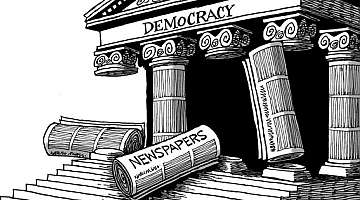Portugal Ranks High When it comes to Press Freedom

Published on
Overall the country of Portugal has raised itself to thirty-third on the list of countries supplied by the RWB (Reporters Without Borders) as far as freedom of the press is concerned. There are currently 179 other countries featured on the RWB list and, although there are others that rank even higher than Portugal, it still holds the honor of being more free with the press than any of its counterparts further south, such as Italy or Greece, for example. Interestingly, it shares the 33rd spot with England as well.
There have been some rather noteworthy changes in the ranking system over the past year. This is due to the fact that there have been so many changes and developments around the world, but most notably in the Middle East and Arab world. In fact, this is the primary reason for the changes in the list as given by RWB. They went on to say that governments continue to see the control of press freedom as something very tempting, especially in those regions where democratic goals and aspirations are seen as a threat to totalitarian regimes and repressive governance.
But 2011 was a landmark year in that it indicated without a doubt that press freedom and democracy seem to go hand-in-hand. Reporters are being seen as ever more influential and this has obviously earned them enemies in some instances, who seek to repress the freedom of the press. This has given rise to censorship debates as well as the suppression of the civil liberties of the peoples in various countries. Unfortunately, when the media is suppressed or muzzled, civil liberties are infringed upon and rights are abused.
Interestingly, we also find that two African nations, Namibia and Cape Verde, have made it onto the list, refraining from obstructing press freedom, whereas this remains a contentious issue in other countries, such as South Africa. In South Africa press freedom is under the spotlight with many in authority calling for censorship.
Libya ranked 154th on the list, with Yemen following in the 171st position. Obviously the end of the Gaddafi era, coupled with the violence in Yemen played a role in how both countries fared. How the media will be allowed to function in these countries is still somewhat of a mystery at this point but it is clear that these rankings will likely change by the time that Reporters Without Borders releases their next list. The same can be said of Egypt, a country that dropped almost forty places to settle in the 166th position.
Syria likewise also dropped in the index to finish at the 176th position. In this country there is a complete and total censorship of the media, not to mention further tactics used to prevent those within the media, journalists and so on, from doing their jobs effectively and properly. Even within Europe there have been countries that have lost ground, such as Turkey which ranked at 148 on the RWB list index. They have refrained from honoring promises of reform and many journalists have been arrested thanks to the country’s judicial system.
A country’s stance on press freedom is a clear indication of the country’s stance on democracy and civil liberties. Countries such as Finland or the Netherlands have always been democratic and open which is why they hold the position that they do on the RWB index. Countries such as Greece and Italy for example, still have work to do. With so much emphasis being placed on muzzling the media in so many countries around the world, it certainly is a sobering thought that in so doing, the peoples of those countries are essentially clueless regarding what their governments and representatives are up to. People have a right to information that affects them and press freedom is essential to a democratic country’s survival. Portugal, now in its new 33rd position, has reason to feel proud.
For information of property for sale in Portugal contact the Portugal real estate team via email at: info@portugalproperty.com or call free on +44 (0) 800 0148201
Published in: News and Updates